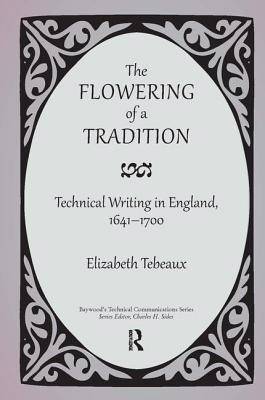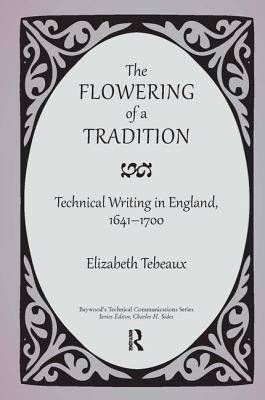
- Retrait gratuit dans votre magasin Club
- 7.000.000 titres dans notre catalogue
- Payer en toute sécurité
- Toujours un magasin près de chez vous
- Retrait gratuit dans votre magasin Club
- 7.000.0000 titres dans notre catalogue
- Payer en toute sécurité
- Toujours un magasin près de chez vous
195,95 €
+ 391 points
Format
Description
The Flowering of a Tradition, which describes the development of technical, or practical, writing in England during the seventeenth century, from 1641 to 1700, follows Emergence of a Tradition, which tracks the emergence of English technical writing from 1475 to 1640, during the English Renaissance. Together, the books present the emergence and development of technical writing in England from 1475 to 1700 by describing and exemplifying the main characteristics and genres of technical writing as they appeared and flowered. Topics include format and page design; recognition of readers' needs in content and presentation; plain style; technical description; technical writing's contribution to the development of the paragraph; text and the use of technology in technical writing; the history of instructions; and the emergence and development of proposals and reports. The two books cover the major topics that continue to form the foundation of the teaching and practice of technical writing and help define the history of practical discourse during approximately 300 years of English history. The history of technical, or practical, writing has not yet been written, and these two books fill a major deficiency in the history of English technical writing. Chapters on the history of the proposal and the history of reports deal with topics never before researched. The chapter on the history of the paragraph shows that paragraphs existed 300 years before composition historians have stated, because technical writing has not been included in studies of the history of English discourse. Even though the majority of English writing is practical writing in any era, it continues to be ignored by social and literary historians. Only book-length studies of the type published here will fill this void. Technical writing will not become a discipline unless we have a series of books providing a clear foundation that unearths its existence and shows its contribution to all of our writing today, in the workplace and other nonacademic settings.
Spécifications
Parties prenantes
- Auteur(s) :
- Editeur:
Contenu
- Nombre de pages :
- 275
- Langue:
- Anglais
- Collection :
Caractéristiques
- EAN:
- 9780895038432
- Date de parution :
- 30-12-14
- Format:
- Livre relié
- Format numérique:
- Genaaid
- Dimensions :
- 152 mm x 229 mm
- Poids :
- 699 g

Les avis
Nous publions uniquement les avis qui respectent les conditions requises. Consultez nos conditions pour les avis.






